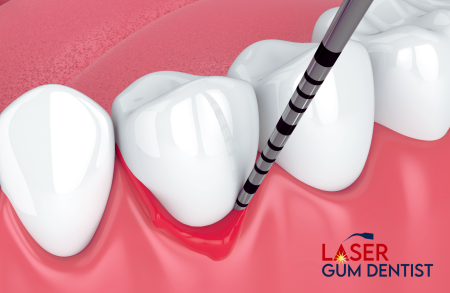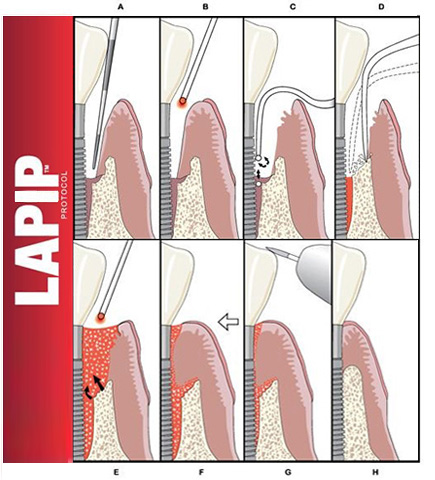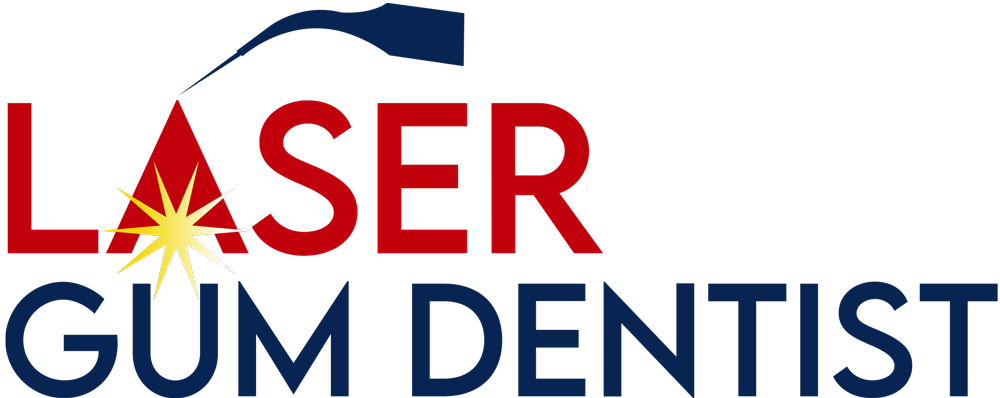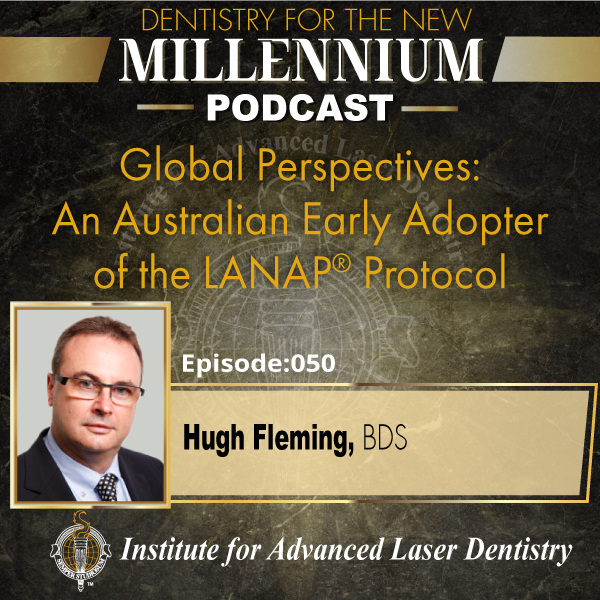About LAPIP®
What is LAPIP®?

Do you have inflammation and infection in the gum and bone around your dental implants (implantitis)? LAPIP® or ‘Laser Assisted Peri-Implantitis Protocol’ is an effective and revolutionary method for treating both early and advanced cases of peri-implant infection.
Around a third of all dental implant patients can be effected by peri-implantitis, a form of gum disease affecting implants. LAPIP® therapy can benefit any stage of peri-implant gum disease and is an excellent treatment for early and advanced cases of peri-implant infection.
LAPIP therapy can benefit all stages of peri-implant gum disease and is an excellent method of treating both early and advanced cases of peri-implant infection.
Symptoms of moderate-advanced peri-implantitis
- Gum swelling
- Implant mobility
- Bleeding gums
- Change in gum colour around the impant
- Increased gum sensitivity
- Implant exposure (gum recession prevents adherence to the implant or crown surface)
- Mild to severe pain around the implant site
- Excretion of pus from the implant’s surrounding tissue
Why choose LAPIP®
Guaranteed less recovery time
Boosted bone regeneration
Guaranteed Less Pain
Less gum recession
Safe for everyone
Guaranteed fewer treatments
The LAPIP Process®

A
B
C
D
E
F
G
H
The LAPIP® Process

A
A periodontal probe is employed to the previously numbed area to determine the degree of gum infection and associated bone loss and assess the severity of infection around each implant.
B
A Periolase® laser vaporizes bacteria, diseased tissue and pathologic proteins causing the peri-implant gum disease.
C
Ultrasonic scalers, as small as the laser, are then inserted into the pocket. Sound waves will break up the hardened tartar and other debris from the surface of the tooth.
D
The bone is modified to stimulate the release of stem cells.
E
The Periolase® laser is employed on a different setting to further disinfect the clean implant surface and stimulate a fibrin clot seal around the implants.
F
Within minutes fibrin reattachment to the implant surface occurs, along with a stable fibrin clot at the gum crest, creating a closed healing environment for ongoing soft tissue and bone healing.
G
The bite forces on the affected implants are adjusted to eliminate any high spots or occlusal trauma which may delay ongoing bone healing.
H
Over time the soft tissue and bone regenerates and attaches to the dental implant.
Frequently Asked Questions
If you have any additional questions or would like to learn more about LAPIP®, please call our office or schedule a consultation.
LAPIP® stands for Laser-Assisted Peri-Implantitis Procedure. It is a laser treatment designed to address peri-implantitis, an infection that affects the gum tissues and bone surrounding dental implants. LAPIP® uses advanced laser technology to clean and disinfect the affected area, promote tissue healing, and help preserve the longevity of your dental implants.
LAPIP® uses a state-of-the-art laser to target and remove infected tissue and bacteria around dental implants. The laser is precisely calibrated to clean the implant surface and surrounding gum tissue while minimizing damage to healthy tissues. This procedure helps to reduce inflammation, promote reattachment of gum tissues, and improve overall implant health.
LAPIP® is a relatively comfortable procedure. The laser treatment is minimally invasive, and local anesthesia is used to ensure you are pain-free during the procedure. Post-procedure discomfort is typically mild and can be managed with over-the-counter pain relief if needed.
The LAPIP® procedure involves the following steps:
Evaluation: We conduct a detailed examination of your dental implants and surrounding tissues, often including diagnostic imaging to assess the extent of peri-implantitis.
Treatment: The laser is used to remove infected tissue and bacteria from around the implant. The treatment also helps to disinfect and smooth the implant surface.
Recovery: After the procedure, you may experience mild swelling and discomfort, which generally resolves within a few days.
The duration of the LAPIP® procedure depends on the severity of the peri-implantitis and the number of implants being treated. On average, the procedure takes between 1 to 2 hours.
Recovery after LAPIP® is usually quick and comfortable with minimal swelling and discomfort. You can typically resume normal activities within a day or two.
Post-procedure care may include:
- Avoiding hard, crunchy, or sticky foods for a few days.
- Practicing gentle oral hygiene with a soft toothbrush and avoiding vigorous brushing around the treated area.
- Using any prescribed mouth rinses or medications as directed.
- Attending follow-up appointments to monitor the healing process and ensure the health of your implants.
LAPIP® has shown to be highly effective in treating peri-implantitis. By targeting and eliminating infection while promoting healing, LAPIP® can improve gum health around dental implants and enhance their long-term success. Many patients experience significant improvement in symptoms and overall implant stability following the procedure.
To determine if LAPIP® is appropriate for your situation, schedule a consultation with us. We will conduct a thorough evaluation of your dental implants and the surrounding tissues to assess your peri-implantitis.
While LAPIP® effectively treats existing peri-implantitis, preventing future occurrences involves maintaining good oral hygiene and attending regular dental check-ups. Our team will provide you with guidance on how to care for your implants and maintain optimal oral health to reduce the risk of future issues.
If you are have peri-implantitis, LAPIP® is a revolutionary laser treatment to eliminate infection and preserve your dental implants.
Call our office to schedule a consultation and learn more about LAPIP® and if this solution is right for you.


